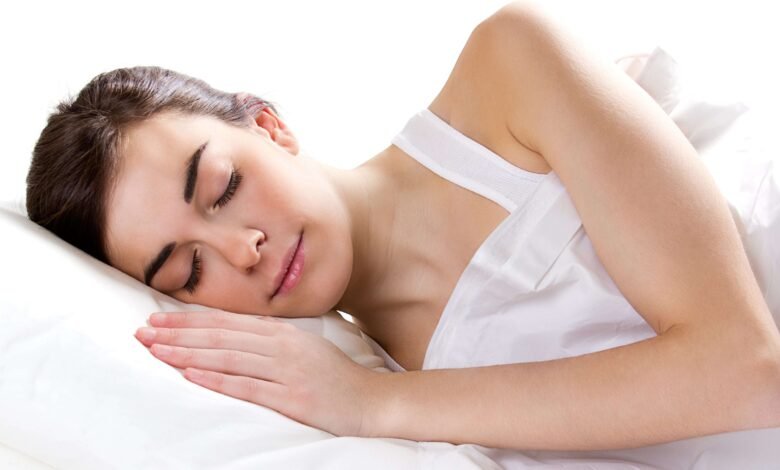Is 6 Hours of Sleep Enough?

It may sound like a dream to get six hours of sleep each night and feel terrific the next day. People with demanding jobs or active lifestyles might wonder if they can function with less sleep at night. Even though some people may frequently function on little sleep, most evidence indicates that adults need more than six hours of sleep each night. According to experts, most individuals should get at least seven hours of sleep each night.
We’ll discuss further in this blog Is 6 hours of sleep enough to feel rested and refreshed? And the effects of doing so are below.
How Much Sleep Is Enough?
The majority of people require more than six hours of sleep each night. Your genetically determined sleep requirement is almost certainly greater than six hours. In actuality, it’s likely longer than eight hours.
The majority of us need more than six hours of sleep, according to studies on sleep. A modest sleep extension study determined the sleep requirements of persons aged 20 to 26. Sleep demands ranged from seven hours 17 minutes to nine hours 16 minutes, average being eight hours and 25 minutes.
Some people are fortunate enough to require six hours of sleep each night. But it’s uncommon. The NPSR1 gene mutation, found by researchers at the University of California, San Francisco, enables you to function on four to five and a half hours of sleep every night. The problem? Less than one in four million people carry the gene.
Furthermore, even if you possess one of these genes, you are not necessarily able to function well with little sleep.
How Much Sleep Is Recommended?
Following your age group, the National Sleep Foundation recommends that you receive the following amounts of sleep:
- Newborns: 14 to 17 hours
- Infants: 12 to 15 hours
- Toddlers: Almost 11 to 14 hours
- Preschoolers: 10 to 13 hours
- School-aged children: Almost 9 to 11 hours
- Teenagers: 8 to 10 hours
- Young adults and adults: Around 7 to 9 hours
- Older adults: 7 to 8 hours
According to research, most adults require at least seven hours of sleep every night. While individual sleep requirements may differ, it is generally accepted that most people need to sleep within healthy limits. Teenagers, for instance, require at least 8 to 10 hours of sleep, whereas youngsters require more sleep, which varies depending on age.
One-third of adults usually get six hours or less of sleep per night, and polls indicate that short sleep may become increasingly widespread. Only a small minority of people require more sleep than is suggested for their age group, on average. Although it is uncommon, some individuals appear to require less than six hours of sleep each night. Others require longer than nine hours, too.
Researchers think that a person’s capacity for short sleep is influenced by genetics. Observing when the body awakens independently, without an alarm clock, is one technique to determine how much sleep is required. A person may be getting adequate sleep for their body if they don’t feel fatigued during the day.
What happens when we only get 6 hours of sleep?
Although many people think they can get by with less sleep, data does not support this claim. According to experts, getting less sleep than is advised might impact one’s health and well-being.
Quality sleep is vital for physical and mental well-being, immune system performance, hunger control, and cell and tissue repair. People may have sleep loss symptoms without realizing they result from insufficient sleep.
1 Short-Sleep Effects on the Mind-
Daytime tiredness, a lack of energy, and decreased motivation are some acute consequences of sleep loss. Losing sleep has negative psychological impacts, such as difficulty concentrating and issues with memory, learning, creativity, and problem-solving. Additionally, those who need more sleep may be less productive at work.
2 Poor Mood from Lack of Sleep-
Short-term sleep deprivation can lead to problems controlling emotions and a propensity for agitation and restlessness. Chronic sleep deprivation may make it more likely for someone to experience depression and other mental health problems.
3 Life Quality is Decreased due to insufficient sleep-
People who don’t get enough sleep may feel generally ill and quickly exhausted. Short sleep duration can also affect a person’s sexual desire and general quality of life.
4 Physical Performance Affected by Sleep Deprivation-
Athletes may discover they have sluggish coordination and slower reaction times when sleep-deprived. Athletes who lack sleep have also been shown to run more slowly, possess less strength, and perform worse while engaging in specific movements like kicking or serving a tennis ball. Lack of sleep can also make athletes feel less enthused and excited when exercising and more susceptible to confusion.
5 Effects of Sleep Deprivation Over Time-
Chronic sleep loss has been linked to kidney illness and conditions, including metabolic syndrome, obesity, and type 2 diabetes. Shortening one’s sleep regularly increases the risk of developing cardiac conditions such as high blood pressure, heart disease, and stroke.
6 Effects on Children-
Children may display sleep deprivation differently from adults. Lack of sleep can cause a youngster to act out, become hyperactive, or struggle to concentrate in class. Mood swings, irrational behavior, impulsivity, and sorrow can also be signs of sleep deprivation in children. Lack of sleep has the same impact on children’s social relationships as it does on adults.
How can we get enough sleep?
Try adhering to the suggestions for good sleep hygiene, such as these beneficial daily routines.
- Have a set routine: Consistently get enough sleep, even on the weekends.
- Please make the most of your sleeping area by keeping it cold, quiet, and dark. You should also invest in a comfy bed with cushions and a mattress.
- Put relaxation first: Establish a sleep regimen with calm pursuits like reading or bathing.
- Reduce your screen time: Before going to bed, put all electronic gadgets away and refrain from clock-watching.
- At most 30 minutes should be spent napping and taken earlier in the day.
- Get moving: Do regular exercise, go outside, and look for sunlight first thing in the morning.
- Reduce substance use: Avoid caffeine, alcohol, and heavy meals right before night.
Popular strategies for reducing sleep debt include napping and sleeping on weekends. You can also lessen the impacts of sleep loss by getting more rest in the evenings before a night when you expect to be unable to get adequate sleep.
But these activities could disrupt your regular sleep-wake cycles and might not give you enough time to make up for lost sleep. The optimum approach is to maintain regular sleeping and waking hours that permit at least seven hours of sleep each night.
Conclusion-
Although 6 hours of sleep may seem like almost a whole night, most don’t get enough. For optimal energy, peak mental performance, and good health, most healthy adults require closer to or more than eight hours of sleep.
Focus on getting adequate sleep instead of obsessing on deep sleep, REM sleep, or quality sleep.
You should fall asleep within 15 to 20 minutes after lights out. Ask your doctor to recommend a sleep specialist if, after trying these methods, you are still having problems falling asleep. The sleep expert may make additional suggestions or assist in identifying and treating underlying sleep disorders.
Source link
#Hours #Sleep



